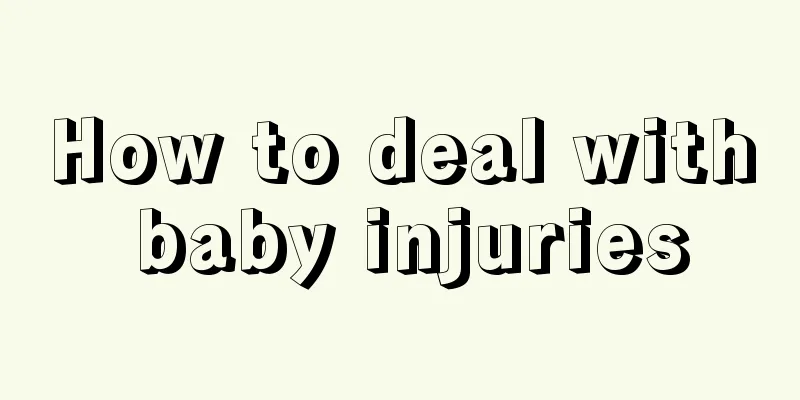How to deal with baby injuries

|
The baby's skin is generally very delicate. Once an injury occurs, it needs to be treated in time, otherwise it is easy to leave scars, especially in summer when the temperature is too high. If it is not handled properly, it will cause inflammation and infection of the wound, which has a great impact on the baby's health. In fact, after the baby suffers an injury, if the wound is serious, you must go to the hospital for treatment in time. How to deal with baby injuries 1. Abrasion An abrasion is a wound caused by a baby falling down. It is only a superficial injury, so the injury is relatively minor and can be treated at home. For very shallow wounds of small area, you can apply iodized oil or alcohol (mercurochrome) to the skin around the wound, and then bandage it with clean and sterilized gauze. If you don't have iodine or alcohol at home, you can clean the wound with clean water, then apply antibacterial ointment, and then put on a Band-Aid. If the abrasion is too large, the wound is stained with sand or dirt that cannot be cleaned off by yourself, or the injured area is swollen, severely painful, the surrounding body tissue is broken, bleeding does not stop, or the injured area is important (such as the face), it is recommended to take the baby to see a doctor. For large and deep wounds, the baby should be taken to the surgery department in time for local debridement and tetanus injection. 2 Laceration In principle, sutures can be done within 24 hours, but if the injury is to the face, sutures must be done as soon as possible. Also, the longer a severe laceration is left untreated, the higher the likelihood of bacterial infection, which may result in delayed illness or residual scars, so you should seek medical attention promptly. 3 Stab If you are stabbed by sharp objects such as nails, needles, glass, etc., a small amount of blood will generally flow out. Because the wound is narrow and deep, bacteria are not easily discharged, so it is easy to cause inflammation. If you are stabbed, no matter how small the wound is, you are at risk of tetanus, so it is important to seek medical attention immediately. When treating a puncture wound urgently, you need to squeeze the wound, which will cause blood to flow out and the bacteria to be expelled. Therefore, wash your hands and use sterile instruments when treating puncture wounds. If you rush to treat a puncture wound with your hands, it may lead to bacterial invasion and inflammation. If possible, first find out what kind of foreign object caused the puncture wound. If it is glass fragments, it may damage the baby's muscles or blood vessels. Therefore, do not handle it yourself at home, but go to the hospital immediately. Because if it is not handled properly, it will cause more bleeding and even damage internal organs and blood vessels. If you are stabbed by a knife or copper or iron product, you should go to the hospital for a tetanus shot. If the foreign object that causes the puncture is not glass and one end is exposed outside the skin, take a pair of tweezers, place the end of the tweezers over a flame for disinfection, and after the tweezers have cooled down, distract the baby's attention so that the baby will not be too nervous, while gently using the tweezers to remove the foreign object. If the foreign body is retained under the skin, the sewing needle can be disinfected with flame or soaked in disinfectant alcohol or disinfectant water for a few minutes. Place a piece of ice on the skin where the foreign body is located to numb the skin to some extent. Then use a sterilized needle to gently pry open the skin to expose the foreign body. Use sterilized tweezers to remove the foreign body. If the puncture wound is caused by a nail, the nail should be pulled out first. Use sterilized tweezers or small pliers to pull out the nail in the direction it entered. Apply even force when pulling it out and do not shake it left or right to reduce damage to surrounding body tissues. If the nail has been pulled out, you can squeeze hard around the wound to squeeze out the blood and dirt to reduce post-injury infection. If the nail breaks in the wound, the baby should stop walking immediately, and the removed nail and the baby should be taken to the hospital for removal through surgery. 4 Cuts A cut is an injury caused by a knife, scissors, glass or a sharp instrument. When you are cut by a knife, first use clean items to stop the bleeding, and then fix it with a bandage. When the wound does not stop bleeding, direct pressure should be used to stop the bleeding. That is, press the wound directly with your fingers or palms, rely on pressure to stop the blood flow, and make the blood in the wound coagulate, or use clean gauze to press the wound to stop the bleeding. If there is a cut on the finger and the wound is bleeding heavily, you should press the arteries on both sides of the finger tightly. The bleeding will usually stop after 5 to 15 minutes of pressure. If the cut is in other parts of the body, apply pressure to stop the bleeding. If the bleeding cannot be stopped, you can use a rubber band to tie it around the area above the bleeding to block the blood flow, and go to the hospital immediately for treatment. The time for tightening the rubber band to stop bleeding should not exceed 15 minutes each time, otherwise it will cause limb necrosis due to prolonged blood flow blockage. After the bleeding stops, disinfect the skin around the wound with 75% alcohol or iodine, cover it with sterilized gauze or a Band-Aid, and finally fix it with a bandage. Please note that deeper, larger wounds or facial wounds should be treated in a hospital and sutured if necessary to avoid leaving too large scars. 5. Bleeding Blood stasis is mostly caused by external force that leads to rupture of subcutaneous capillaries. Blood seeps into the subcutaneous tissue from the ruptured capillaries, so a bruise can be seen on the intact skin. At this time, the blood that has seeped into the subcutaneous tissue is considered a foreign body, and the subcutaneous tissue is rich in nerves, so the pain is obvious. If bruises appear on the skin, you should quickly use cool water or ice to reduce swelling. If the injured part is an arm or leg, elevating the arm or leg can help reduce swelling. 24 hours after blood stasis occurs, you can apply warm water to the affected area to promote local blood circulation and accelerate the dissipation of blood stasis. Generally speaking, subcutaneous hematoma can be slowly absorbed by the body, which takes about 2 weeks. 6 Scratches When babies gather together to play, they are easily scratched by their friends. If the problem is not serious, just disinfect it properly and it will heal naturally soon. It should be noted that running water should be used when cleaning the wound. If the injury is serious and you have a fever, or if you are scratched by a small animal, you should seek medical treatment immediately. |
<<: What to do if your child has white ringworm on his face
>>: What should I do if my child develops herpes?
Recommend
Can epilepsy in children be cured?
The treatment of childhood epilepsy cannot be rus...
Prevention and treatment of scarlet fever: prevention and treatment to reduce harm
If a child contracts scarlet fever, he or she wil...
What should I do if my child has milk curds in his poop?
Since the baby is still young and cannot speak, t...
Why does a four-month-old baby urinate less?
Some babies will have the problem of less urine, ...
What is the reason for frequent urination in little boys?
Frequent urination and urgency are more likely to...
Scarlet fever in children can be cured on its own
Once scarlet fever is discovered, disinfection me...
Girl's forehead bone bulge
If a girl has a bony bulge in the middle of her f...
What is the reason why babies always sleep restlessly?
It is a very common situation for newborns to hav...
What should students do if they have hunchbacks?
As many students grow older, they have more and m...
A child fell again after recovering from a fracture for half a month
Children are lively and active. Various activitie...
Two-year-old baby's poop smells really bad
Feces are excess waste in the human body, so when...
What should I do if my child has poor digestion?
Children need a variety of nutrients as they grow...
Why do two-year-old babies love to bite?
A two-year-old baby always likes to bite people. ...
How to treat children's autumn diarrhea
Children's physical health has always been a ...
The role of probiotics in infants
The baby's body will always encounter some pr...









